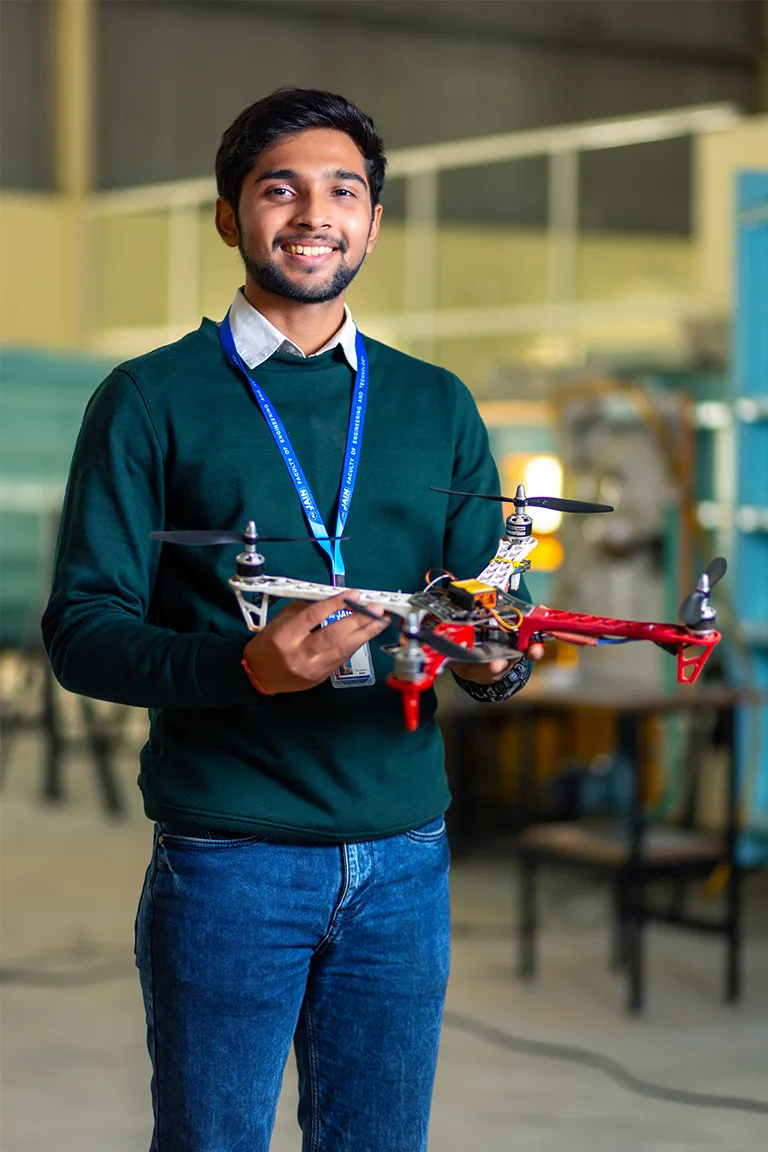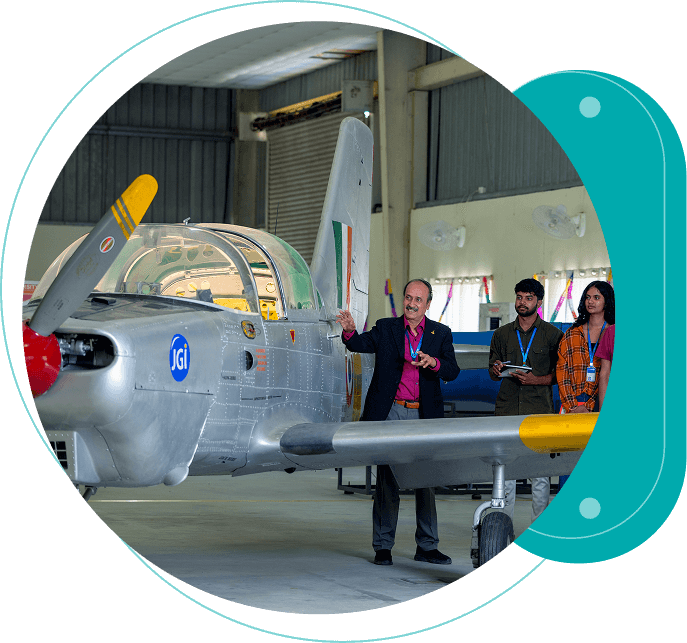
The B.Tech programme in Aeronautical Engineering, offered by the Department of Aerospace Engineering, JAIN (Deemed-to-be University), Faculty of Engineering & Technology (JU-FET), is designed to meet the current requirements of the aviation sector. It deals with all the fundamental aspects and advanced topics related to aircraft design, materials, manufacturing, maintenance, and allied activities. Students will be well-equipped with the necessary knowledge for a challenging and exciting career in aeronautics and related industries.
Recognised among the best BTech Aeronautical Engineering colleges in Bangalore, JAIN (Deemed-to-be University) provides a future-focused curriculum that prepares students for innovation in the aerospace domain. The programme also ranks among the top BTech Aeronautical Engineering colleges in Bangalore, offering a solid foundation in core aeronautical concepts and their real-world applications.
As one of the top BTech Aeronautical Engineering colleges in India, the institute emphasises a hands-on learning approach supported by cutting-edge labs and industry-driven projects. Its reputation also places it among the best BTech Aeronautical Engineering colleges in India, attracting aspiring engineers nationwide.
The course covers essential areas such as aerodynamics, propulsion systems, structural analysis, flight mechanics, and control systems. It also explores emerging technologies shaping the future of aviation. Students looking for aeronautical engineering courses in India will find this programme aligned with academic depth and practical exposure.
The BTech in Aeronautical Engineering eligibility typically includes completion of 10+2 with Physics, Chemistry, and Mathematics, along with entrance qualifications as the university and relevant authorities prescribe. The BTech Aeronautical Engineering syllabus includes foundational and advanced modules, ranging from fluid dynamics and thermodynamics to avionics and aerospace materials, ensuring graduates are ready to contribute meaningfully to the sector. It deals with vehicles flying within Earth’s atmosphere, such as aeroplanes, helicopters, and unmanned aerial vehicles (UAVs), equipping learners with the skills to pursue diverse roles in research, manufacturing, testing, and maintenance.
Graduate will be proficient in applying technical knowledge and exhibit skills essential for a prosperous professional career
Graduates will gain expertise in research and technological innovation for social impact
Graduates can work independently and in a team with professional ethics

Tata Technologies CATIA v5, Siemens PLM NX, Siemens PLM Teamcenter, and Engineering skills offering certification courses
Certification in Technical Publications by Capgemini
Flight Lab Training at IIT Kanpur
Cessna 172 Static Flight Simulator - Hands-on experience
Aero modelling workshop and co-curricular activities such as participation in student clubs, national & international competitions, etc

Aeronautical Engineers work in the aviation and Defence sectors, such as the Air Force. They apply scientific and technological principles to research, design, construct, and test the performance of civil and military weapons, aircraft, and missiles. Maintaining these also falls under their job profile. These engineers use Computer Software, such as Computer-Aided Design (CAD), to develop aircraft or related avionics.
Yes. Aeronautical engineering is considered a promising career due to its role in advancing aviation and aerospace technologies and the potential for innovation.
Aeronautical engineers design, develop, and test aircraft and related systems, ensuring they meet safety and performance standards.
Many institutions require JEE scores for admission into aeronautical engineering programmes, but some may have alternative entrance criteria.
Yes. ISRO hires aeronautical engineers for various roles in its aerospace and satellite projects.
Yes. NASA employs aeronautical engineers in various capacities to work on aviation and space exploration projects.
Yes. Aeronautical engineers typically earn competitive salaries, reflecting their specialised skills and the industry's demand for their expertise.
The qualification for aeronautical engineering generally includes a Bachelor's degree in aeronautical or aerospace engineering.
Yes. Aeronautical engineering is a viable field for the future, with ongoing technological advancements and a growing focus on sustainable aviation.
Yes. Aeronautical engineers are in demand due to the increasing need for innovative solutions in the aviation and aerospace industries.